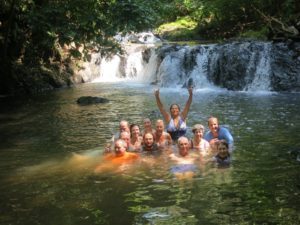Tourism in Costa Rica is one of the fastest-growing economic sectors of the country. Since 1995 it represents the first source of foreign exchange in the economy, generating more income than the export of its traditional crops such as banana, pineapple, and coffee. The direct and indirect jobs created by tourism have allowed reducing the country’s poverty by 3%.

The tourism boom began in 1987, with a gradual increase from there in the number of visitors, reaching one million in 1999 and exceeding 2 million in 2008 to reach a record high of 2.8 million tourists in 2018.
Our nation is one of the most important ecological tourism destinations in the world. Since 25% of its area is composed of national parks and protected areas with lush vegetation, diverse fauna and two seas. The government continually invests resources in National Parks such as Corcovado, Tortuguero, and Monteverde Cloud Forest, using this budget to maintain the parks in all its elements. Also offering impressive beaches such as Tamarindo, with national and international surfing competitions, and of course its spectacular active volcanos.
North American and European tourists, who together represent 65% of foreign visitors, contributed with an expenditure of $ 1000 per tourist in 2018. Visitors from the Caribbean Basin and South America have as their main reasons for travel to our country business and professional affairs, while North Americans and Europeans for rest and vacations.

In recent years, several of the best travel service providers in the country have been recognized internationally for their commitment to positive tourism for the planet, the local airline Natura Air, Hotel Punta Islita (Tourism Award for the Future), sponsored by the World Travel and Tourism Council (WTTC), the Lapa Ríos Ecología (Sustainable Prize) Standard-Setter awarded by the Alliance for Forests.
The Ecological Blue Flag program is inspired by a similar program developed in Europe in 1985; it was created to promote tourism while limiting the negative impacts on the ecosystem, through adequate coordination for avoiding pollution and protecting the health and well-being of locals and visitors alike. The government with support from private national and foreign companies has been responsible for citizen security and ecological education campaigns in an evaluation conducted by this program.
In 2019, a total of 59 beaches earned the highest distinction, making a lot of publicity among potential visitors. Including the list of “The 10 Best Ethical Destinations in the Developing World” 2018”, which is based on a study of developing countries around the world to identify the best tourist destinations among this group of nations, evaluating categories such as environmental protection, social welfare, and human rights.

